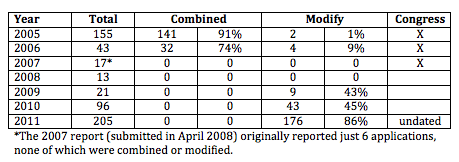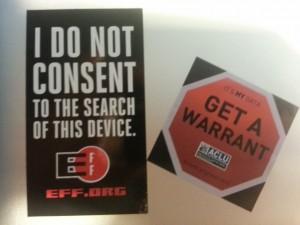The Holder-Clapper Letter Ought to Make You Worry about Leahy’s USA Freedom
As the press is reporting right now, James “Too Cute by Half” Clapper and Eric Holder have written Patrick Leahy a letter endorsing his version of the dragnet reform bill. Reports claim this shows that Clapper supports reform.
Consider me unimpressed.
To understand why, it helps to understand what this letter was once supposed to do. According to a Senate source who is skeptical this reform does enough, it was supposed to provide language that would endorse civil libertarians’ understanding of key terms of the bill. I’m not sure if the letter is still supposed to do that work — if it is not, that is a story unto itself. But the language in this letter doesn’t make any commitments on the key points of concern.
As an initial matter, I was told this letter would include language making it clear that the “connection chaining” language I’ve been so concerned about would limit contact chaining to actual calls made. The letter doesn’t address connection chaining at all. Huh. How about that?
Here’s what Clapper’s letter says about the prospective call detail record (CDR) collection:
The bill also provides a mechanism to obtain telephone metadata records in order to identify potential contacts of suspected terrorists inside the United States. The Intelligence Community believes that, based on communications providers’ existing practices in retaining metadata, the bill will retain the essential operational capabilities of the existing bulk telephone metadata program while eliminating bulk collection.
It’s good news the IC is not asking for data retention requirements — but you ought to ask why, given that the most important provider, Verizon, has told the Senate Intelligence Committee that it only keeps billing records — not CDRs — for 18 months.
Note, however, that Clapper doesn’t use CDR language here — he uses “metadata,” which is actually broader — potentially far broader — than CDRs as defined by the bill. We know, for example, that the IC considers location data metadata — and James Cole told Mark Warner they might ask for hybrid orders to get location data. We know from the ICREACH documents that the IC admits it uses a different definition of metadata than the FISA Court does (the IC’s definition of metadata not only includes content, but also substantive information about people). We know that providers store customer things-that-count-as-metadata on their clouds, indefinitely. Adopting metadata here, in short, may back off the otherwise limited definition of CDR, which is one of the bills laudable limiting factors.
The letter’s claim to end bulk collection does nothing to reflect that the IC’s definition of bulk — anything without a discriminator — has nothing to do with the common English definition of it; it certainly doesn’t promise to end the English language definition of bulk. Moreover, it only promises to limit bulk collection to the “greatest extent practicable.”
[T]he bill permits collection under Section 215 of the USA PATRIOT Act using a specific selection term that narrowly limits the scope of the tangible things sought to the greatest extent reasonably practicable, consistent with the purposes for seeking the tangible things. Recognizing that the terms enumerated in the statute may not always meet operational needs, the bill permits the use of other terms, provided there are court-approved minimization procedures that prohibit the dissemination and require the destruction within a reasonable period of time of any information that has not been determined to satisfy certain specific requirements.
That “reasonably practicable” language is a direct quote from the bill. It adds nothing, and given that Bob Litt refuses to limit FBI back door searches because it’s not practicable, what the IC means by practicable could very easily encompass gross privacy violations — ones that have already been approved by FISC! And remember–the IC can use corporate persons as selection terms.
Then the letter all but admits it will use selection terms that violate this principle, but points to the minimization procedures required by the law to rationalize that. As I’ve pointed out, there’s no reason to believe the minimization procedures will be any more stringent than what the FISC currently requires — and there’s at least some reason to suspect they might be weaker than current minimization procedures. (And remember, the retention requirements for the CDR authority almost certainly broadens permitted dissemination to foreign intelligence purpose, which might lead to a similar broadening of it elsewhere under the authority.)
The transparency paragraph includes this language.
the transparency provisions in this bill … among other things, [] recognize the technical limitations on our ability to report certain types of information.
This is James Clapper saying quite clearly to anyone willing to listen that he sees this bill — which explicitly carves out FBI back door searches from any transparency reporting — as Congressional endorsement of the idea that we should never demand the number of FBI back door searches. This language, by itself, ought to make the bill toxic.
Congratulations NGOs. You’re backing the idea that the FBI should be able to use 702 and 12333 collected information in criminal contexts with zero oversight or accountability.
Finally, Clapper’s letter makes it clear that Leahy’s bill will do nothing to stop ex parte communication between the Executive and FISC. And he even points to John Bates’ ridiculous letter (huh, now we have a better sense of who put Bates up to that!) to warn he’ll carve out even more.
We believe that the appointment of an amicus in selected cases, as appropriate, need not interfere with important aspects of the FISA process, including the process of ex parte consultation between the Court and the government. We are also aware of the concerns that the Administrative Offices of the U.S. Courts expressed in a recent letter, and we look forward to working with you and your colleagues to address these concerns.
Especially after we learned Bates single-handedly rewrote PATRIOT last year to make it okay to spy on Americans for their protected speech, we should do nothing to accommodate Bates’ wishes, especially since he didn’t speak with the authority of his position. The FISC, as Bates envisions it, doesn’t resemble a real court at all.
In short, there’s one piece of good news in this letter — that the IC won’t ask for data retention requirements — and a whole lot of reason to be even more skeptical of the bill.






